How to Hire Node.JS Developers
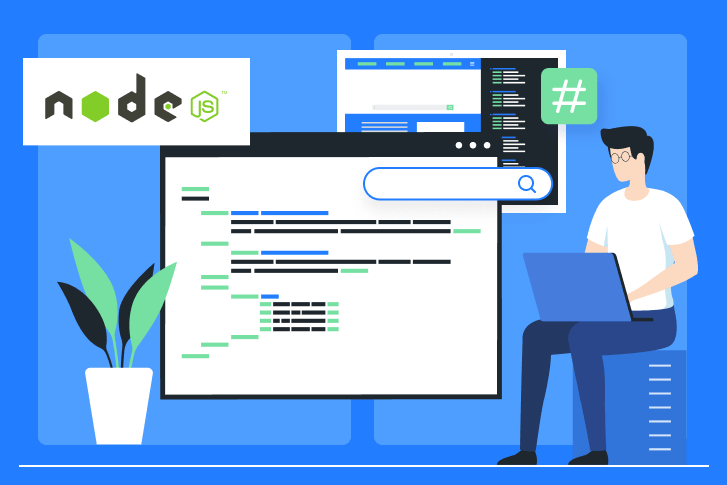
What Does Node.js Development Mean?
Node.js development is a cross-platform, scalable, and open-source JavaScript runtime environment that utilizes I/O architecture and makes application development considerably more effective. JavaScript Node is typically applied for applications that need a continuous connection between the browser and the server, for example, web push notifications, chats, or news feeds.
What Does A Node.js Developer Do?
A Node.js developer is required to do a variety of tasks, including coding, debugging, and collaborating with front-end programmers, among others, depending on the project's needs.
Benefits of Node.js
Node.js has gained an outstanding reputation among programmers and developers and has been intensely popular for almost a decade. The reason for such success can be attributed to its high efficiency, lightweight, and data-intensive real-time applications. When several connections are necessary for optimal performance and speed, it is when Node.js always comes in handy. JavaScript Node is known to be used by several tech titans, including PayPal, IBM, LinkedIn, Netflix, and Microsoft. There are several reasons why companies choose to do web development using Node.js:
- Quick performance and scalability have been verified;
- Possibility to use efficient and reusable code to create both the frontend and backend;
- Smooth data streaming;
- Extensive NPM repository containing a large number of libraries;
- Managing an ever-increasing number of connections at the same time;
- Outstanding server-side development.
Bringing so many advantages to the development world, Node.js´s popularity is growing at a fast pace among programmers. As a matter of fact, StackOverflow reports that 51.4% of the respondents of their survey have developed a project with Node.js at least once.

Additionally, the same source proves that Node.js is the most wanted technology.
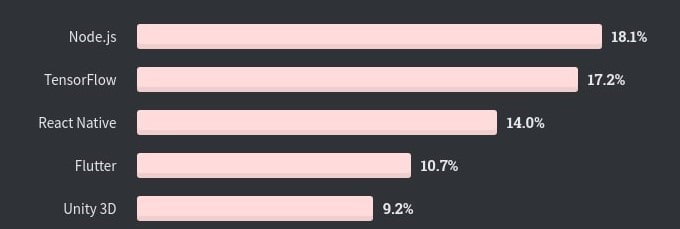
Frameworks, Tools & Languages Used In Node.js Application Development
As Node.js offers development companies to construct scalable online apps with only one programming language, it is considered to be one of the fastest and most reliable server-side web app platforms. As discussed earlier, it's an open-source and cross-platform JavaScript runtime framework, which leads to the possibility to write code outside of the browser. There are several frameworks and tools available to assist developers in constructing fully functioning Node.js apps. Let's take a look at some of the most loved Node.js frameworks, tools, and other languages.
Node.js Frameworks
Hapi
Hapi can create whole websites as well as enterprise-level functionality. Input and response validation, server-side caching, sessions, cookie processing, logging, and other features are also available. Hapi also created a number of API development plugins for a variety of purposes, including documentation, authentication, and other features.
Express
It is one of the most significant Node.js frameworks that have an adjustable request processing mechanism. Express works well with a wide range of community-developed modules that cover the great majority of project needs. Template engines, Middleware, and other functionalities, as well as multiple routing, have been simplified.
ActionHero
ActionHero provides custom packages and high-end customer service for businesses of all sizes. Developers utilize it to provide users with real-time information and even let them connect with one another via chat rooms, which this framework naturally enables. Indeed, ActionHero is well-known for its scalability.
Derby.js
Derby is an MVC architectural application framework with a comprehensive stack. Derby synchronizes JSON and text data between browsers, servers, and databases, allowing for real-time collaboration. It supports server-side rendering, offline use, conflict resolution, and template bindings, all of which aid multi-user application development.
Koa.js
Koa.js is a framework for quickly developing web APIs and apps. Koa.js employs generated-based control flows to eliminate callbacks and decrease errors. Koa is less reliant on middleware than other frameworks and is more modular. However, there are plugin packages available for routing, compression, caching, and other tasks.
Keystone
Keystone is a free full-stack framework based on Express and a few more components. It enables database-driven web pages, applications, and APIs to be created. Its main selling point is that it instantly produces an Admin UI for you to manage your database-driven website.
Node.js Tools
Log.io
Keeping track of hundreds of files distributed across many computers can be tough. Log.io is a real-time log monitoring solution that may help you monitor and debug your deployments fast. It provides a stateless TCP API to which you may send your logs. You can monitor all of your log messages in a single browser session, allowing you to quickly handle issues and faults.
Broccoli
Broccoli is a Node.js build tool that uses an ES6 module and offers quick rebuild and compilation times, chainable plugins, and a flexible ecosystem.
Babel
Babel is a front-end development tool that lets you use all of ES6's capabilities while compiling ES5 for usage in production. As a result, the readability of the code has increased. Babel provides the most recent version of JavaScript, allowing you to use the most up-to-date syntax without having to wait for browser support. It may also be used in conjunction with other JavaScript applications.
Electrode.io
Electrode.io is a worldwide platform that allows you to build React.js and Node.js apps using standardized frameworks, cutting-edge technologies, and best practices. Electrode.io prioritizes consistency and universality over configuration and customization. This ensures reusability and effectiveness.
Webpack
Webpack is a JavaScript module bundler that makes deployments easier by creating asynchronously loaded bundles that save time. Webpack makes bundling and serving assets simple, fast, and seamless.
PM2
PM2 keeps track of all started processes to see if they're working properly.
Languages Used With Node.js
Researches prove that developers use at least three other languages in their Node.js web development projects in addition to Node.js. Despite the fact that they vary from year to year, here are the programming languages that, generally, are most often used with Node.js:
- JavaScript
- Python
- .Net
- PHP
- Java
- C++
- Swift
- Go
- Ruby
- C
Well-Known Applications Built With Node.js
Netflix
The world's largest supplier of video streaming, including movies and TV shows, with over 190 countries covered. For the whole user interface, the team opted for Node.js. It was so efficient and generally successful that the firm wants to apply it to other layers of the stack as well.
PayPal
In a bid to upgrade its mobile application, PayPal, in 2013, opted to migrate to JavaScript and Node.js with over 200 million users. PayPal's technical teams were divided into two groups: those who programmed for the browser and those who coded for the server, which posed a significant challenge. As a result, they decided to utilize the same language for both the browser and the server, which was JavaScript.
The leading social network for business and employment also uses Node.js. In 2011, LinkedIn switched its mobile app backend from Ruby on Rails to Node.js. LinkedIn received considerable benefits from switching to Node.js.
Uber
Uber is a rapidly-growing online software that connects consumers in need of transportation with taxi trips. Uber was among the first companies to operate Node.js. Node.js is a perfect match for the massive matching system of the organization.
NASA
NASA has relied on Node.js to ensure the safety of its astronauts. After an incident in 2013, NASA decided to create its own end-to-end data system and switched to Node.js. They decided to switch their information management system to the cloud and created a Node.js architecture that could process large amounts of data.
Other world-famous companies that applied Node.js app development include Amazon, Trello, Reddit, Disney, Medium, eBay, and Yahoo.
How to Hire Node.js Developer: Step-By-Step Guide
It's difficult to find a Node.js developer with the right skill set for your company's specialty. Despite the fact that it is a time-consuming and exhausting procedure, it is critical to the success of your project. Using reputable sources and employing correct recruitment tactics and procedures can assist you in locating the talent required for your project.
We have created a step-by-step guide on how to hire Node.js experts, and it is intended to assist you in your search.
1. Create an Attractive Job Description for Node.js Developer
To begin your search for a Node.js developer, you'll want to create an enticing job description and try to make sure it's as appealing as possible. It must clearly define and highlight all essential Node.js developer requirements to avoid any misunderstandings and achieve total transparency. In order to match the criteria of your project, you must define in-depth who your ideal applicant is and what skill set they may possess. On the whole, the most required Node.js developer skills are the following:
- Knowledge of front-end technologies;
- Deep understanding of Node.js Frameworks such as Hapi, StrongLoop, Total.js, Sinatra Koa.js among many others;
- Proficiency in APIs and API communication;
- Understanding of asynchronous programming and its solutions;
- Expertise in testing;
- Authorization and user authentication expertise;
- Ability to code that is both efficient and effective;
- Error-handling skills;
- Expertise in debugging;
- Expertise in database management;
- Automation and building tools;
- Web performance.
Always remember that the abilities you describe in your job description will vary according to the organization’s and project's objectives. For example, the Node.js backend developer job description will be distinct from the full-stack Node.js developer job description. Even if it is the same technology, the necessary skills to carry the job successfully done vary for both. Always consider the fact that in order to attract the finest applicants, you have to make sure to define and explain in detail the skill set you require for each project.
2. Where to Look for Node.js Developers?
There is a huge variety of websites where you may locate your best matching Node.js candidate, depending on what you're looking for. Choosing the proper recruiting website is critical to your project's success. Here are some suggestions.
Traditional Job Portals
If you're short on time, traditional job websites may be able to help you rapidly discover a Node.js developer that will perfectly match your organization's demands. LinkedIn Jobs, CareerBuilder, and Glassdoor are just a few examples.
Node.js Conferences
Attending a conference is one of the most interesting methods of searching for a Node.js programmer. Conferences attract a diverse range of talent, increasing your chances of finding someone who is a perfect match for your project's requirements.
Freelance Websites
There is an immense number of projects that are of interest to a lot of independent programmers. If you're searching for a freelance Node.js developer, keep an eye on well-known freelance marketplaces like Upwork, Fiverr, Lemon.io & Gun.io.
Remote First Forums
On remote-first forums, you can be sure to discover people who would be happy to work remotely for your organization. Angel.co, Remotive, and WWR are some of the prominent websites for JavaScript Node.js development jobs.
Outsourcing Companies
This is the most efficient and cost-effective way of searching for a Node.js developer to incorporate into your team. Node.js development companies can supply you with qualified personnel who are a perfect match for your project's needs. Ukraine, Romania, and Poland, for example, are among Eastern Europe's most popular outsourcing destinations.
3. Ask Candidate the Right Interview Questions
Apart from an accurate study of the Node.js developer resume, correctly interrogating the candidate will reveal whether the developer truly has all the necessary expertise and knowledge. Candidates' interview questions for a Node.js full stack developer will obviously differ from those for junior or mid-level professionals. Furthermore, asking the correct questions will reveal the candidate's thinking process and approach to problem-solving. If you are preparing to interview a Node.js developer for a project, you should ask the following questions:
Check for a Technical Background
Such questions are a wonderful approach to get the interview started. You may inquire about the candidate's past job history, as well as his or her duties in previous roles. You may expect to collect information on the following topics:
- Basic programming knowledge
- Node.js knowledge and skills
- Project experience
Candidates should be able to talk about their technical background and work since this will help to clarify their programming knowledge. It's a good idea to ask for examples of previous or current work.
Ask About Completed Certifications and Courses
Because the JavaScript programming language offers so many options for advancement, obtaining certifications opens up a lot of professional opportunities and advantages. Inquiring about certificates and courses might help to authenticate a professional's abilities and clarify their understanding of the language. Furthermore, not only should your interview questions include information about the candidate's expertise and deep understanding of Node.js frameworks and tools, but also it is strongly advised that you ask for the completed certifications and courses as proof.
Don’t Forget About the Soft Skills
It's critical to assess the soft skills of your potential candidate before integrating them into the workflow. This will help you understand how the applicant will work with the rest of the team and express his or her requirements and thoughts. Pay attention to the candidate's attitude to see how he or she will react in difficult situations, as well as his or her competence and willingness to learn new skills along the way. It may be of interest to you that there are recruitment tools that may assist you in identifying soft talents too.
Node.js Developer Salaries and Hourly Rates
The demand for Node.js developers is considerable in nearly every sector and region for both small organizations and enterprises of the medium size as well as giant corporations. Let's have a look at the hourly rates and compensation for freelance Node.js developers, full-time local programmers, and full-time remote developers.
Node.js Freelancers
Short-term initiatives profit from employing freelancers since they do not require a long-term commitment from the freelancer. Freelance Node.js developers are self-employed, which means they may work from home and set their own hours.
According to one of the most famous freelance platforms Upwork, the average hourly rates of Node.js developers are ranging from $18 to $38 per hour.

Local Full-Time Node.js Developers
Hiring local full-time developers is the ideal option when you need a programmer for a lengthy period of time. Due to geographical restrictions, hiring a specialized Node.js developer may take longer; nevertheless, you will be employing a professional who will take the time to fully grasp your company's operations and participate in all essential projects and procedures. There are a lot of talented developers out there that are willing to work full-time and possess all the best skills required for Node.js developers.
Average Salary of Node.js Developer in the United States
The average income of Node.js developers in the United States is influenced by a number of factors. The statistics obtained from multiple sources may vary depending on the degree of expertise, location, and skill mastery, among other factors. Thus, according to Talent.com the average salary of Node.js developers in the United States is $112,900 per year, making $9,408 per month or $57.90 per hour.
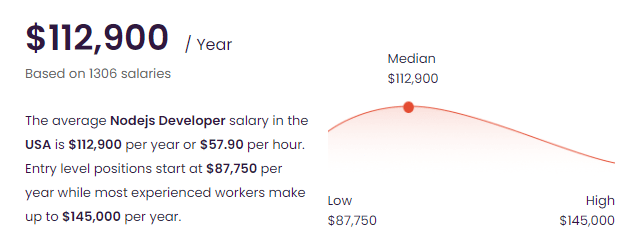
From the data shown above, it is possible to conclude that junior Node.js developer salary starts at $87,750 per year when the very experienced programmers can make up to $145,000 per year.
Full-Time Remote Node.js Developers
Hiring on a remote basis gives you more freedom in terms of location and time zones, as well as the ability to locate the right talent at a reasonable price. Due to their professionalism, amazing programming abilities, and excellent English communication, Ukraine has become a popular destination for outsourcing front-end developers. Hiring Node.js development companies in Ukraine is an excellent option for companies looking to expand their team for a project, save money, or just avoid the time-consuming recruiting procedure.
Let's compare the average income of front-end developers in Ukraine to the figures we've previously gathered from the US.
However, according to dou.ua, the largest developer community in Ukraine, the average monthly compensation of a Node.js developer of middle seniority level is $3000 ranging from $2500 to $3300 per month.
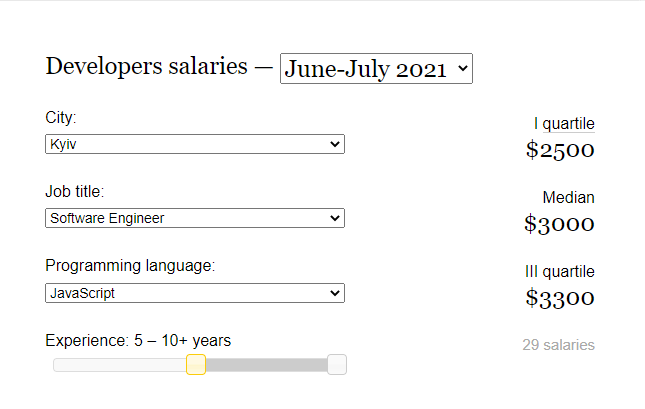
Same source reports that the average senior Node.js developer's salary is $4625 per month ranging from $4000 to $6000. In stark contrast to the recruiting market in the United States, this is the net compensation of Ukrainian developers.
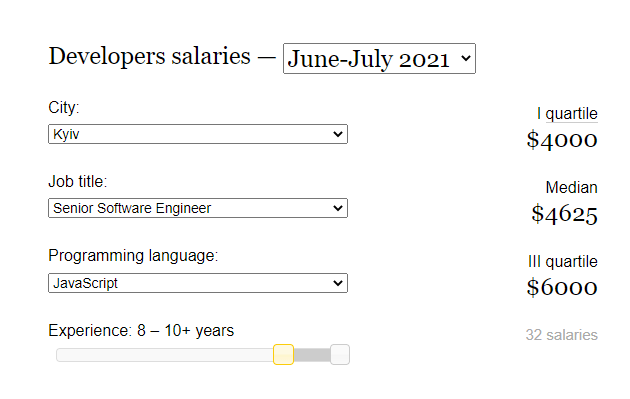
We can confidently claim that hiring a Node.js developer is a function of your budget now that we have a comprehensive picture of the rates and pricing of hiring Node.js programmers in the United States and Ukraine.
Conclusion
Now that you have obtained all the necessary knowledge to make the best decision when hiring Node.js web developers, always remember to keep your company’s objectives and demands in mind. Employing freelancers is the ideal option for short-term and small projects, full-time programmers perfectly match lengthy projects, and hiring on a remote basis gives you more flexibility in terms of location and time zones, as well as increasing your chances of finding the right talent at a reasonable price. Overall, thanks to the popularity of Node.js web development services, finding a developer with all of the necessary abilities is a manageable effort that needs careful thought and study of a variety of criteria.
If you want to hire a Node.js developer to obtain the greatest results and have your project successful, you should think about what country to seek professionals in and then choose the finest businesses that offer Node.js development services from there. It's also important to evaluate how much money you're willing to spend on your project's development and hire a programmer accordingly.
Ukraine is, without a doubt, one of the most popular countries for IT outsourcing. Ukraine's IT business is thriving, and according to dou.ua research data, it grew by 27 percent in 2017. Ukrainian developers have earned a worldwide reputation as competent and highly talented experts over the years. In fact, according to Stack Overflow, Ukraine has around 166.000 tech specialists, and their number is rising every year thanks to excellent technical education. As a result, your project´s quality will not be affected; the only concern is how much you want to invest.


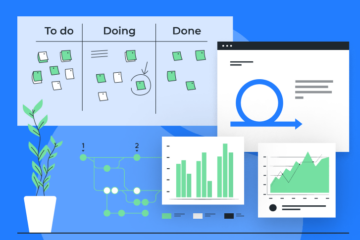


No comments